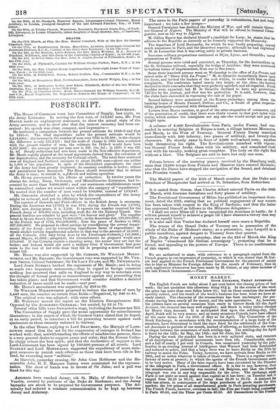POSTSCRIPT.
SATURDAY.
The House of Commons went into Committee of Supply, last night, on the Army Estimates. In moving the first vote, of 113,847 men, Mr. Fox MAULE made an explanatory statement, to show the actual state of the Army accounts, and to show also that the utmost economy had been ex- ercised: his speech was clear, compact, and impressive— He instituted a comparison between the present estimate for 1848-9 and that for 1835-6. The total expenditure under the present estimate would be 6,318,6861.: the increase in the number of men over 1835 is 32,488; in the charges the difference is only 525,2301.: had the scale of charge in 1835 been continued with the present number of men, the estimate for 1848-9 would have been 6,957,3061.: the average cost per man now is 391. 10s. 8d.; in 1835 it was 421. 4s. 4d. Steady reductions had also been made in the Non-effective department. Mr. Mauls rapidly glanced at the usual arguments derived from the extension of our dependencies, and the necessity for Colonial reliefs. The total force scattered over all England and Scotland amounts to about 30,000 men—about one soldier to 1000 of the population. In spite of the diminished expenditure, the state of the Army has been greatly improved: its sanatory condition is better; crimes and 'punishment have decreased. The House should remember that to reduce the Army is easy; to recruit it, a.difficult and tedious operation.
Mr. HUMS persevered in his efforts at reduction. In twelve years the charge for Army, Navy, Ordnance, and Miscellaneous Estimates, had in- creased by more than 9,000,0001.; and our enormous establishments most be retrenched, unless we would come within the category of "repudiators." He moved that the number of men voted be 100,000, instead of 113,847.
Mr. OSBORNE sketched a plan by which the expenditure of the Army might be reduced, and yet its efficiency be increased.
The number of Generals and Field-officers in the British Army is enormous. Daring the American war (1783) it was 824; during the French war (1799), 1,863; now, during peace, it is 2,106. It exceeds the number required for the French Army of 400,000 men, including staff, &c. for the National Guard. Our present burdens are entailed by past wars " for honour and glory.° The supplies voted in Queen Anne's time were 70,000,0001.; in the American war, 129,000,0001.; in the French war of 1792, 284,000,0001.; from the peace of Amiens to 1815, 827,000,0001. He proposed to effect savings by consohclating the several depart- ments of the Army, and by retrenching superfluous items of expenditure: he would abolish various departmental salaries in that way to the amount of 53,0001.: all the Colonels, (theduty being done by the Lieutenant-Colonels,) 145,9001.; second Majors, 41,0001.: altogether, the retrenchments he proposed would save 570,0001. If the Colonies require a standing army, the sooner they are lost the better; and Ireland would not need a military force if Government had gone more to the root of her evils than they did in proposing a mere landlord and tenant bill.
Mr. Hume was also supported by Mr. COBDEN, Sir WILLIAM MOLES- WORTH, and Mr. BRIGHT; the Government vote was supported by Mr. VER- NON SMITH, Colonel SIBTHORP, Sir DE LACY EVANS, and Mr. NEWDEGATE.
Lord JOHN RUSSELL backed the arguments of Mr. Maule; and in doing so made two important statements,—that in regard to foreign countries nothing has occurred that calls on England in any way to entertain even the thought of formal protest or remonstrance against any proceeding that has taken place; and that Government would consider whether a decided reduction of taxes could not be made—next year.
Mr. Hume's amendment was negatived, by 293 to 39.
Sir WILLIAM MOLESWORTH proposed to reduce the number of men by 5,449 men, the number on return from India.—Negatived, by 246 to 45. The original vote was adopted; with some others.
Mr. WORTLEY moved the report on the Election Recognizances Bill. Opposed by the ATTORNEY-GENERAL; but carried, by 92 to 73.
Several other bills were forwarded a stage, including the Income-tax Bill.
The Committee of Supply gave the usual opportunity for miscellaneous discussions; in the course of which Sir GEORGE GREY stated that he hoped, at an early period, to introduce a bill for protecting tenants against such ejectments as those recently enforced in Galway.
In the other House, replying to Lord BEAUMONT, the Marquis of LANs- ixiwRR stated that the act for the suppression of outrages in Ireland has worked well; that, notwithstanding the efforts of mischievous persons, there is a very general desire to support peace and order; that the Roman Catho- lic clergy evince the best spirit; and that the declaration of support to the Lord-Lieutenant has been signed by 160,000 persons of all creeds. Lord STANLEY and Lord MONTEAGLE suggested the expediency of more strin- gent measures to punish such offences as those that have been rife in Ire- land, far exceeding mere " sedition."
At Harwich, yesterday evening, Sir John Cam Hobhouse and the Ho- nourable John H. T. Manners Sutton were nominated for the represen- tation. The show of hands was in favour of Sir John; and a poll was fixed for this day.


























 Previous page
Previous page